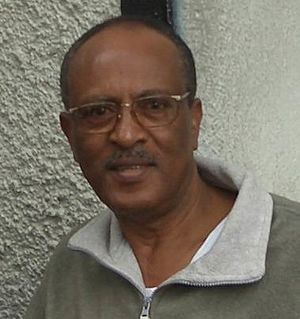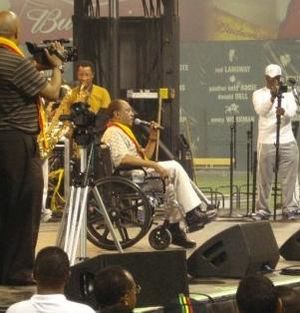Tilahun Gessesse facts for kids
Quick facts for kids
Tilahun Gessesse
|
|
|---|---|
 |
|
| Background information | |
| Born | 27 September 1940 Addis Ababa, Italian East Africa (now Ethiopia) |
| Died | 19 April 2009 (aged 68) Addis Ababa, Ethiopia |
| Genres | |
| Instruments | Vocals |
| Years active | 1955–2009 |
| Labels | Ethio Grooves |
| Associated acts |
|
Tilahun Gessesse (Amharic: ጥላሁን ገሠሠ; 27 September 1940 – 19 April 2009) was an Ethiopian singer. Many people consider him one of the most famous Ethiopian artists of the 1900s. He was known for his strong tenor voice. People called him "The Voice" during Ethiopia's "Golden Age of music" in the 1960s.
Tilahun was a very important singer. His music left a lasting mark on Ethiopian music. Besides being popular, he helped raise money for people during famines in the 1970s and 1980s. This made him very loved by his country. He received a special doctorate degree from Addis Ababa University. He also won a lifetime achievement award for his amazing work.
Tilahun passed away from diabetes on April 19, 2009. This happened shortly after he came back from the United States. His funeral was held in Addis Ababa at Holy Trinity Cathedral. Many famous people and fans gathered to say goodbye. Tilahun's work is often compared to Teddy Afro. Teddy Afro is another singer who has greatly influenced Ethiopian music.
Contents
Life and Music Career
Early Life and Musical Dreams
Tilahun Gessesse was born on September 27, 1940, in Addis Ababa. His father, Gessesse Negusse, was Amhara. His mother, Gete Gurmu, was Oromo.
Tilahun went to Ras Gobena Elementary school in Waliso. His grandfather lived there. As he grew up, Tilahun became very interested in music. His grandfather wanted him to focus on his school studies instead. The school principal, Shedad, encouraged Tilahun's musical talent. He even suggested Tilahun go to Sudan to follow his music dreams.
Tilahun did not go to Sudan, but he took the advice seriously. One day, artists from the Hager Fikir Theatre visited his school. Tilahun talked to one of them, Eyoel Yohanes, about his love for music. Eyoel told him to go to Addis Ababa if he wanted to become a musician.
Tilahun decided to leave school and travel to Addis Ababa. He started his journey on foot without telling his family. He walked about fifteen kilometers before being found in Tulu Bolo. He stayed with his aunt there overnight. The next day, he was sent back to his grandfather in Waliso. But Tilahun was so excited about music that he did not stay long. After just one night, he left again for Addis Ababa. This time, he hid in the back of a truck.
Becoming a Star Singer
In Addis Ababa, Tilahun first got a job at the Hager Fikir Association. This group is now known as the Hager Fikir Theatre.
After a few years, he joined the Imperial Bodyguard Band. There, he became a very important singer. During his time with the band, something difficult happened. There was an attempt to overthrow the government in December 1960. This was done by the Imperial Bodyguard. Tilahun was arrested and put in prison for some time because of this.
Later, Tilahun moved to the National Theater. His success continued to grow there. His tenor voice was considered the best pop voice in Ethiopia during the 1960s. He became so popular that he performed three times for Emperor Haile Selassie I. The Emperor even advised him to use his talent wisely.
During the 1970s and 1980s, Tilahun made many recordings. These recordings helped raise a lot of money for people affected by famines. Most of his songs were in the Amharic language. However, he also recorded some songs in the Oromo language.
In 1975, Tilahun released an album called Tilahun Gessesse. He also released cassette albums in 1992. He worked with The Walias to re-record older songs starting in 1983.
Tilahun released his first single song, "Yehagere Shita," in 1970. He continued to release many more popular singles. These included "Tiz Alegn Yetintu" and "Min Libejegn."
He received an honorary doctorate degree from Addis Ababa University. This was to thank him for his great contributions to Ethiopian music. He also won an award for his lifetime achievements.
His Passing and Funeral
Tilahun passed away on April 19, 2009, in Addis Ababa. He was being taken to the hospital by his wife. He had just returned to Ethiopia from the United States. He had been unwell for several years because of diabetes.
The Ethiopian Prime Minister, Meles Zenawi, spoke about Tilahun. He said Tilahun was a great artist who helped make Ethiopian music popular worldwide. The head of the Ethiopian Orthodox Tewahedo Church, Abune Paulos, also spoke. He said Tilahun left behind many important things that will live on for generations. The United States Ambassador, Donald Yamamoto, said Ethiopians owed a lot to Tilahun.
A special candlelit gathering was held for Tilahun. This took place in the garden of the National Theatre. On April 23, a large public funeral was held. About one million Ethiopians gathered in Meskel Square in Addis Ababa. Government officials and entertainers were there. They heard messages of sadness from the prime minister and President Girma Wolde-Giorgis. A funeral service was held at the Holy Trinity Cathedral. Fans from all over the world posted messages on a special website to remember him.
Discography
| Title | Year | Label |
|---|---|---|
| Tilahun Gessesse (LP) | 1975 | Amha Records |
| Tilahun Gessesse Vol. 1/ Vol.2 | 1992 | Ethio-Grooves |
| Greatest Hits | 2000 | Ethio Sound ES-116 |
| Title | Year | Label |
|---|---|---|
| "Yehagere Shita" | 1970 | Philips Records |
| "Alegn Yetintu"/"Emnete" | 1970 | Philps, Philip |
| "Kulun Manqualesh" | 1970 | Philips Records |
| 'Sithed Siketelat"/'Yefikir Tizita" | 1970 | Philips Records |
| "Ketero Yikeber"/Ewnet Marign" | 1974 | Philips Records |
| "Sew Manen Yimeslal" | 1975 | Amhara Records |
| "Atkelidge"/"Fikir Sew Ayimertim" | 1975 | Philips Records |
| "Erishiw"/"IIhud" | 1976 | Philips Records |
- Contributing artist
- Éthiopiques Volume 17 – Buda Musique 82266-2 (2003)
- The Rough Guide to the Music of Ethiopia – World Music Network (2004)
See also
 In Spanish: Tlahoun Gèssè para niños
In Spanish: Tlahoun Gèssè para niños
- Music of Ethiopia
 | Emma Amos |
 | Edward Mitchell Bannister |
 | Larry D. Alexander |
 | Ernie Barnes |


